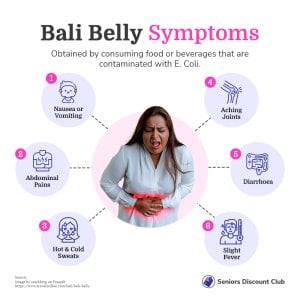How one traveller's dream trip to Bali became a nightmare
- Replies 7
When you think of going on a holiday in Bali, Indonesia, what comes to mind? Bright blue beaches, beautiful sunny days, and lavish accommodations that almost every traveller has on their bucket list. Sadly, lurking beneath the surface of this paradise is a hidden danger known as ‘Bali Belly’.
Also known as ‘Delhi Belly’ or ‘Montezuma’s Revenge’, Bali Belly is exactly what it sounds like – ‘traveller’s diarrhoea’. Yikes! The thing is, it can affect anyone, so even the most experienced globetrotters can fall victim to it.
Unfortunately, that’s exactly what one Bali tourist, Tammy Whelan, had to face during her recent holiday to Indonesia. Just three days into her Bali trip, she came down with the illness. In a now-viral TikTok video, she detailed her ordeal as ‘no joke whatsoever’, and shared that it led to massive abdominal pain and dehydration that led to hallucinations.
‘So from my experience of having Bali Belly, there’s a lot of people who don’t tell you about having it,’ Tammy can be heard saying in the video.
‘You cannot be (more than) four metres (from) a toilet and you’re going to be severely excreting from your mouth and bottom all at the same time.’
‘The thought of food will make you physically sick, you’re going to be severely dehydrated, and you’re going to hallucinate.’ she continued.
One Facebook user also shared her family member’s ‘horrific’ experience with Bali Belly. ‘He has been sick all day with Bali belly and (has) ear aches. There’s also a lot (of) vomiting and sh**ing,’ she wrote in the post.
Source: @tammywhelan8
What are the symptoms of Bali Belly?
Dr Emma Rees, an Australian doctor and the founder of ‘Femma’, explained that Bali Belly happens when you ingest bacteria from contaminated food or water. She added that you may experience severe symptoms for up to five days, including diarrhoea, abdominal pains, hot and cold sweats, and aching joints.
‘Headaches are also possible symptoms and these can indicate dehydration which is the main clinical risk of traveller's diarrhoea.’ she said. Other symptoms include a slight fever, weakness, and discomfort.
What can I do to avoid suffering from Bali Belly?
No one wants to spend their dream holiday in the toilet or with debilitating stomach pains. When travelling to countries where ‘traveller’s diarrhoea’ is very common—such as in Thailand, Vietnam, and Cambodia—Dr Rees advised tourists to ensure that their drinking water is filtered, boiled, or bottled.
‘Avoid ice as this can be made from contaminated water, likewise, salad and fruit may have been washed in contaminated water,’ she said. ‘If you can, rewash such items in bottled or filtered water. Avoid buffets with food sitting out in temperate conditions as food may warm up to a temperature optimal for bacteria to replicate. Ensure you are eating and drinking at reputable establishments.’
She added that about a third of travellers experience the common illness.
The most common bacteria which causes Bali Belly is E. Coli. As tempting as it is to have the most authentic experience while on holiday, tourists don’t have the same immunity as the locals .
In addition, the bacteria that causes Bali Belly is contagious and can be transmitted between people. If you're travelling with someone who is sick from the illness, practise strict personal hygiene and avoid sharing food or drinks with them to minimise your risk of contracting the sickness.
What can I do if I suspect that I have ‘traveller’s diarrhoea’?
Dr Rees urged those with Bali Belly to get plenty of rest, sip fluids regularly, and ensure they are consuming and using clean water.
‘You can take analgesics for pain and temperatures and if your symptoms are getting no better or if you develop blood in your stools make sure you see a doctor,’ she added.
‘It is worth making sure that you have travel insurance to cover local medical fees if needed. If you can’t get fluids in you will also need to see a medical professional. We should also make sure that our enthusiasm to experience different places and cultures doesn’t make us forget hand hygiene and the risk of bacterial infection with different food hygiene practices.’

So, if you’ve been meaning to visit Bali (or any other country where the disease is common), remember that it’s better to be safe than sorry when you’re deciding what to eat and where to stay.
Have you ever experienced ‘traveller’s diarrhoea’? Share your story and tips with us in the comments below!
Also known as ‘Delhi Belly’ or ‘Montezuma’s Revenge’, Bali Belly is exactly what it sounds like – ‘traveller’s diarrhoea’. Yikes! The thing is, it can affect anyone, so even the most experienced globetrotters can fall victim to it.
Unfortunately, that’s exactly what one Bali tourist, Tammy Whelan, had to face during her recent holiday to Indonesia. Just three days into her Bali trip, she came down with the illness. In a now-viral TikTok video, she detailed her ordeal as ‘no joke whatsoever’, and shared that it led to massive abdominal pain and dehydration that led to hallucinations.
‘So from my experience of having Bali Belly, there’s a lot of people who don’t tell you about having it,’ Tammy can be heard saying in the video.
‘You cannot be (more than) four metres (from) a toilet and you’re going to be severely excreting from your mouth and bottom all at the same time.’
‘The thought of food will make you physically sick, you’re going to be severely dehydrated, and you’re going to hallucinate.’ she continued.
One Facebook user also shared her family member’s ‘horrific’ experience with Bali Belly. ‘He has been sick all day with Bali belly and (has) ear aches. There’s also a lot (of) vomiting and sh**ing,’ she wrote in the post.
Source: @tammywhelan8
What are the symptoms of Bali Belly?
Dr Emma Rees, an Australian doctor and the founder of ‘Femma’, explained that Bali Belly happens when you ingest bacteria from contaminated food or water. She added that you may experience severe symptoms for up to five days, including diarrhoea, abdominal pains, hot and cold sweats, and aching joints.
‘Headaches are also possible symptoms and these can indicate dehydration which is the main clinical risk of traveller's diarrhoea.’ she said. Other symptoms include a slight fever, weakness, and discomfort.
What can I do to avoid suffering from Bali Belly?
No one wants to spend their dream holiday in the toilet or with debilitating stomach pains. When travelling to countries where ‘traveller’s diarrhoea’ is very common—such as in Thailand, Vietnam, and Cambodia—Dr Rees advised tourists to ensure that their drinking water is filtered, boiled, or bottled.
‘Avoid ice as this can be made from contaminated water, likewise, salad and fruit may have been washed in contaminated water,’ she said. ‘If you can, rewash such items in bottled or filtered water. Avoid buffets with food sitting out in temperate conditions as food may warm up to a temperature optimal for bacteria to replicate. Ensure you are eating and drinking at reputable establishments.’
She added that about a third of travellers experience the common illness.
The most common bacteria which causes Bali Belly is E. Coli. As tempting as it is to have the most authentic experience while on holiday, tourists don’t have the same immunity as the locals .
In addition, the bacteria that causes Bali Belly is contagious and can be transmitted between people. If you're travelling with someone who is sick from the illness, practise strict personal hygiene and avoid sharing food or drinks with them to minimise your risk of contracting the sickness.
What can I do if I suspect that I have ‘traveller’s diarrhoea’?
Dr Rees urged those with Bali Belly to get plenty of rest, sip fluids regularly, and ensure they are consuming and using clean water.
‘You can take analgesics for pain and temperatures and if your symptoms are getting no better or if you develop blood in your stools make sure you see a doctor,’ she added.
‘It is worth making sure that you have travel insurance to cover local medical fees if needed. If you can’t get fluids in you will also need to see a medical professional. We should also make sure that our enthusiasm to experience different places and cultures doesn’t make us forget hand hygiene and the risk of bacterial infection with different food hygiene practices.’
Key Takeaways
- Bali belly, also known as ‘traveller’s diarrhoea’, is caused by ingesting bacteria from contaminated food or water.
- Symptoms of Bali Belly include diarrhoea, abdominal pain, hot and cold sweats, aching joints and headaches.
- Drinking and using water that is filtered, boiled, or bottled can help minimise your risk of getting the disease.
- Travel insurance is recommended for anyone visiting countries where ‘traveller’s diarrhoea’ is common, as medical costs can be expensive.
Have you ever experienced ‘traveller’s diarrhoea’? Share your story and tips with us in the comments below!










